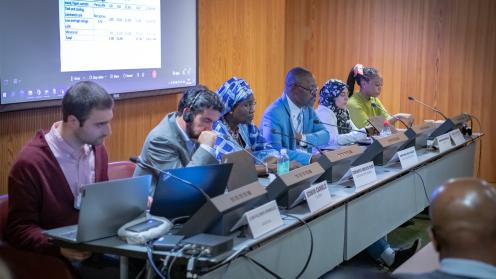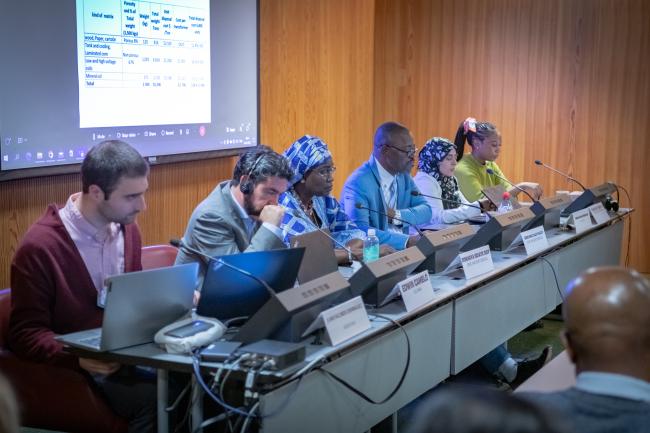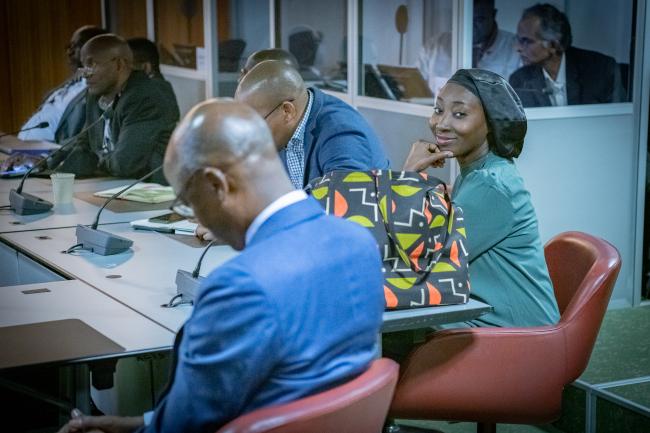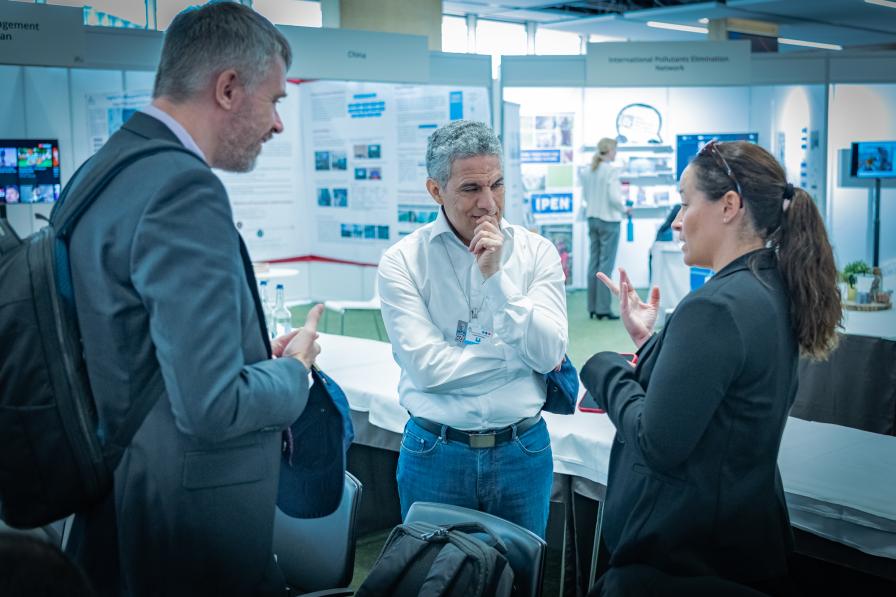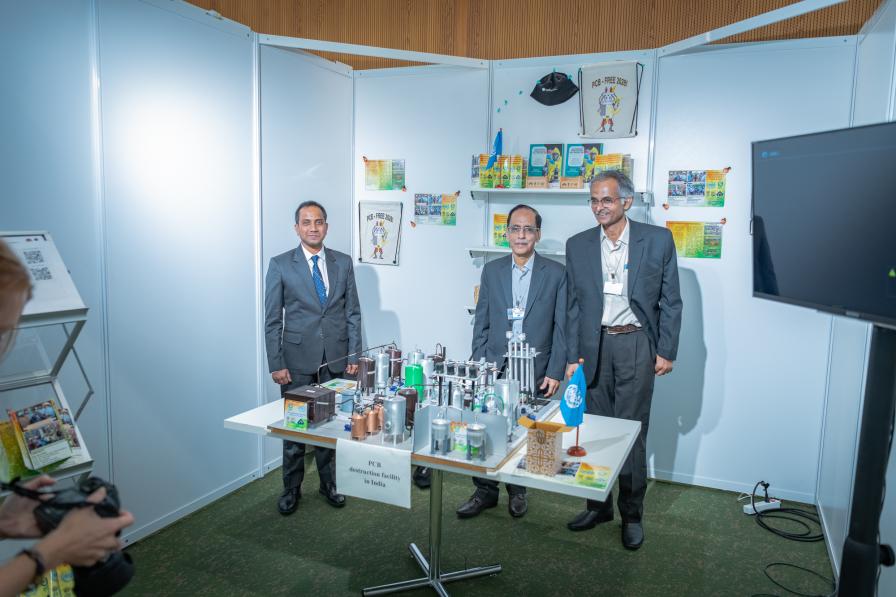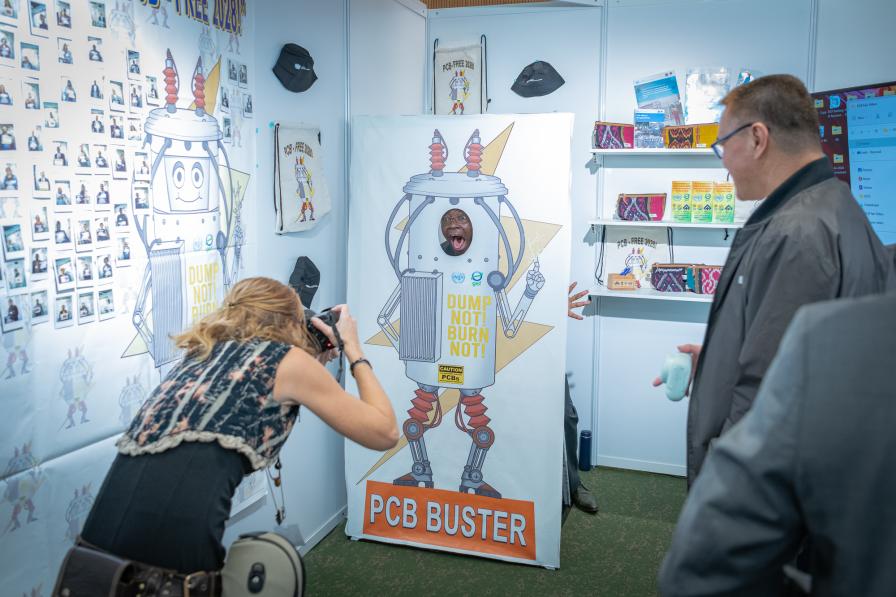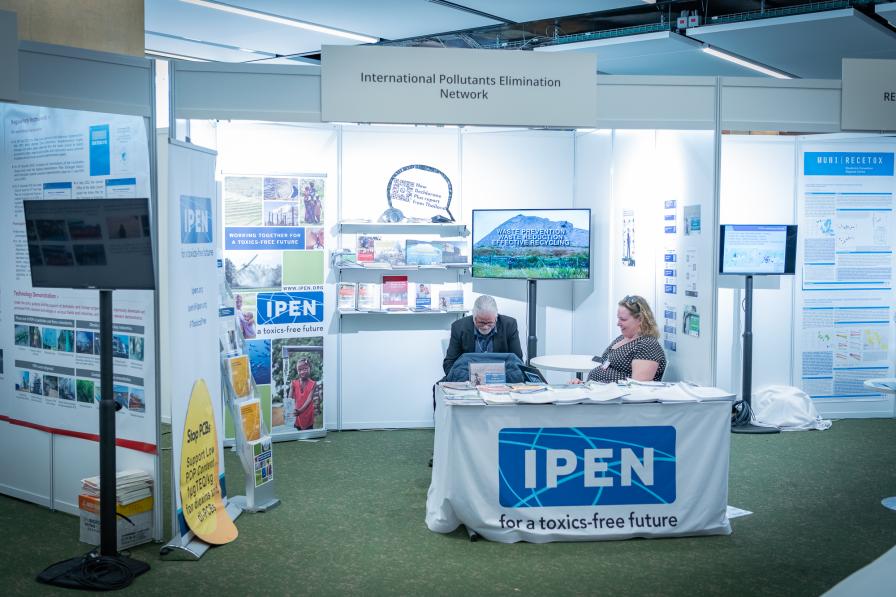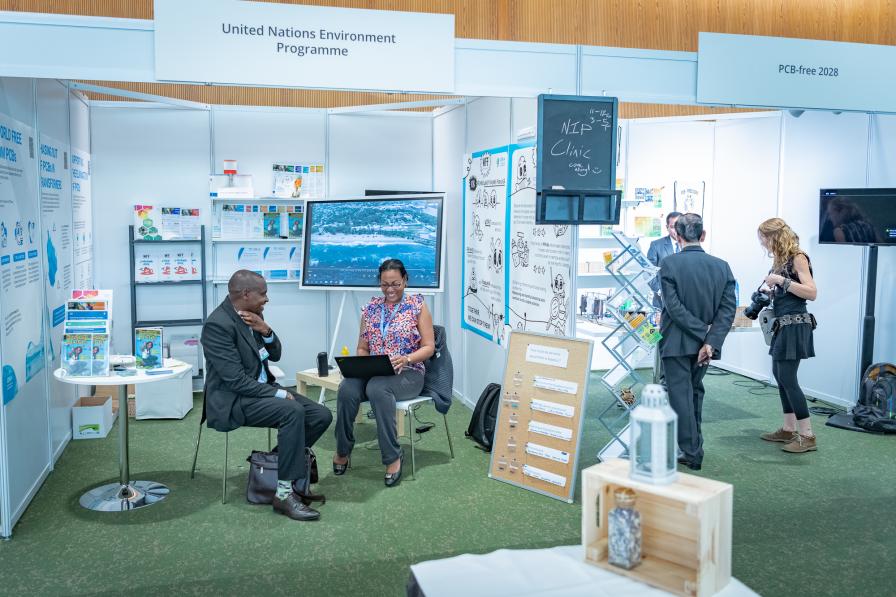About
A panel of experts share experiences with national and regional projects to eliminate PCBs discussing results achieved, challenges, and lessons learned.
On Thursday evening, a panel of experts shared their experiences with national and regional projects to eliminate PCBs, in line with parties’ obligations under the Stockholm Convention. The panel was moderated by Serge Molly Allo'o Allo'o (Gabon).
Yves Guibert, International Consultant for PCBs, outlined a business model developed for West African countries that facilitates both elimination and replacement of PCBs. Noting that the 2028 target may not be met by states in this region, he said that most transformers that have been eliminated were out of service, while in-service transformers are still in use due to lack of funding for replacements and the need to maintain electricity generation capacity. He underscored that energy efficiency gains and reduction of CO2 emissions resulting from replacement of transformers could contribute to the costs of replacement.
Thandeka Mbatha, Projects Coordinator, Africa Institute, described a project to dispose of PCB contaminated equipment in twelve countries in southern Africa. She highlighted several achievements, such as the harmonization of national regulatory infrastructure, enhanced capacity for environmentally-sound management (ESM) of PCB-containing equipment in service, establishment of a regional mechanism for ESM of decommissioned and phased-out PCB liquids and equipment, and stakeholder engagement to facilitate dissemination of lessons learned. She noted challenges including poor access to information on PCBs, non-responsiveness of some equipment owners who did not understand the significance of PCBs, and physical access to transformers due to difficult terrain. She underscored the need for resources to assist with replacement of in-service contaminated equipment, national and regional awareness raising, and capacity building for monitoring.
Michael Scholand, Energy-Efficient Transformer Expert, UNEP, outlined a project in collaboration with the Africa Institute and countries in the Southern African Development Community. Based on regionally representative data from Mozambique, his analysis indicated that cost-effective investment in energy-efficient transformers is a pathway to removing PCBs from installed transformer stock. He said that, regionally, a total investment of approximately USD 34 million is needed, and that this investment will generate net present value savings of USD 35 million (with an 8% discount rate). He also highlighted substantial expected CO2 savings arising from improved energy efficiency.
Juan Facundo Domínguez, Technical Advisor, Ministry of Environment and Sustainable Development, Argentina, described actions taken by his ministry, including inspections of establishments and equipment, PCB management training for workers, and requirements for registration of difficulties with documentation or the legal framework. He noted that completing the inventory has been challenging, as Argentina is a large and federal country.
Edwin Camelo MartÍnez, Analyst in POPs Demonstrative Projects, Ministry of Environment and Sustainable Development, Colombia, outlined the five pillars of his country’s capacity building work, including a regulatory framework, analytical capacity, treatment and elimination services, inventory, and risk management and communication. He said that stakeholders are aware of PCBs but lack information about chemicals and hazardous waste management, so the government has provided training and guidelines on safe management of both PCBs and other chemicals.
Shaimaa Elsayed Mohamed Aly, Director of the Final Disposal Department and Waste Management Regulatory Agency, Ministry of Environment, Egypt, shared her country’s successes with PCB elimination. She described purification and treatment of transformer oils from PCBs that restore the properties of the oils and allows them to be reused, noting the value of this given current oil prices. She highlighted that Egypt is building capacity through training of engineers, and cited a need to complete a survey of contaminated equipment in additional sectors.
An expert from the Ministry of Environment, Forest, and Climate Change, India, explained that 71.3% of PCBs in India are used in the power sector, and said the key challenge is safe storage. She highlighted guidelines that have been distributed to stakeholders, as well as awareness-raising programmes for power utilities throughout the country. She further underscored the use of non-combustion technologies for destroying PCBs, including de-chlorination, a plasma system, and an indirect thermal sorption system. She also noted that mobile units have been commissioned to destroy low-concentration PCBs at power stations.
The PCB Fair will continue on Friday.
View past and future events
Past event
1st Session of the INC for an International Legally Binding Instrument for Implementing International Action on Certain Persistent Organic Pollutants (POPs)
Past event
1st Session of the Criteria Expert Group (CEG-1) for Persistent Organic Pollutants (POPs)
Past event
2nd Session of the INC for an International Legally Binding Instrument for Implementing International Action on Certain Persistent Organic Pollutants (POPs)
Past event
2nd Session of the Criteria Expert Group (CEG-2) for Persistent Organic Pollutants
Past event
3rd Session of the INC for an International Legally Binding Instrument for Implementing International Action on Certain Persistent Organic Pollutants (POPs)
Past event
4th Session of the INC for an International Legally Binding Instrument for Implementing International Action on Certain Persistent Organic Pollutants (POPs)
Past event
5th Session of the INC for an International Legally Binding Instrument for Implementing International Action on Certain Persistent Organic Pollutants (POPs)
Past event
Conference of Plenipotentiaries on the Stockholm Convention on Persistent Organic Pollutants (POPs)
Past event
6th Session of the INC for an International Legally Binding Instrument for Implementing International Action on Certain Persistent Organic Pollutants (POPs)
Past event
7th Session of the INC for an International Legally Binding Instrument for Implementing International Action on Certain Persistent Organic Pollutants (POPs)
Past event
1st Meeting of the Conference of the Parties (COP1) to the Stockholm Convention on Persistent Organic Pollutants (POPs)
Past event
2nd Meeting of the Conference of the Parties (COP2) to the Stockholm Convention on Persistent Organic Pollutants (POPs)
Past event
2nd Meeting of the Persistent Organic Pollutants Review Committee (POPRC-2)
Past event
3rd Meeting of the Conference of the Parties (COP3) to the Stockholm Convention on Persistent Organic Pollutants (POPs)
Past event
3rd Meeting of the Persistent Organic Pollutants Review Committee (POPRC-3)
Past event
4th Meeting of the Persistent Organic Pollutants Review Committee (POPRC-4)
Past event
4th Meeting of the Conference of the Parties (COP4) to the Stockholm Convention on Persistent Organic Pollutants (POPs)
Past event
5th Meeting of the Persistent Organic Pollutants Review Committee (POPRC-5)
Past event
6th Meeting of the Persistent Organic Pollutants Review Committee (POPRC-6)
Past event
5th Meeting of the Conference of the Parties (COP5) to the Stockholm Convention on Persistent Organic Pollutants (POPs)
Past event
7th Meeting of the Persistent Organic Pollutants Review Committee (POPRC-7)
Past event
8th Meeting of the Persistent Organic Pollutants Review Committee (POPRC-8)
Past event
2013 Meetings of Basel Convention COP11, Rotterdam Convention COP6, Stockholm Convention COP6, and ExCOPs2
Past event
9th Meeting of the Stockholm Convention’s Persistent Organic Pollutants Review Committee (POPRC-9)
Past event
POPRC and CRC Joint Meeting, and CRC-9
Past event
10th Meeting of the Stockholm Convention’s Persistent Organic Pollutants Review Committee (POPRC-10)
Past event
2015 Meetings of the Conferences of the Parties to the Basel, Rotterdam and Stockholm Conventions (BRS COPs)
Past event
11th Meeting of the Stockholm Convention’s Persistent Organic Pollutants Review Committee (POPRC-11)
Past event
12th Meeting of the Persistent Organic Pollutants Review Committee (POPRC-12)
Past event
2017 Meetings of the Conferences of the Parties to the Basel, Rotterdam and Stockholm Conventions (BRS COPs)
Past event
13th Meeting of the Persistent Organic Pollutants Review Committee (POPRC-13)
Past event
14th Meeting of the Persistent Organic Pollutants Review Committee (POPRC-14) to the Stockholm Convention on Persistent Organic Pollutants (POPs)
Past event
2019 Meetings of the Conferences of the Parties to the Basel, Rotterdam and Stockholm Conventions
Past event
15th Meeting of the Persistent Organic Pollutants Review Committee to the Stockholm Convention (POPRC-15)
Past event
16th Meeting of the Persistent Organic Pollutants Review Committee to the Stockholm Convention (POPRC-16)
Past event
2021 Meetings of the Conferences of the Parties to the Basel, Rotterdam and Stockholm Conventions (BRS COPs)
Past event
17th Meeting of the Persistent Organic Pollutants Review Committee to the Stockholm Convention (POPRC-17)
Past event
Face-to-Face Meetings of the Conferences of the Parties to the Basel, Rotterdam and Stockholm Conventions (BRS COPs)
Past event
18th Meeting of the Persistent Organic Pollutants Review Committee to the Stockholm Convention (POPRC-18)
Past event
2023 Conferences of the Parties to the Basel, Rotterdam, and Stockholm Conventions (BRS COPs)
Past event
PCB Fair: Launch of the report on progress towards elimination of PCBs
Past event
PCB Fair: Results achieved, challenges and lessons learned on PCB elimination to meet the Stockholm Convention goals
Past event
PCB Fair: Tools and guidance to support parties achieving the 2025 and 2028 Targets on PCB
Past event
